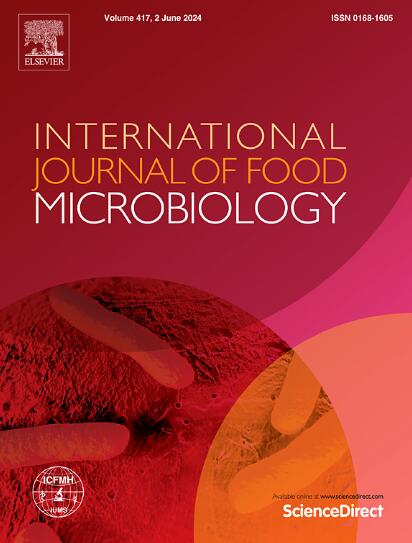Multi-omics signature profiles of cold-smoked salmon from different processing plants: Insights into spoilage dynamics
IF 5.2
1区 农林科学
Q1 FOOD SCIENCE & TECHNOLOGY
International journal of food microbiology
Pub Date : 2025-05-02
DOI:10.1016/j.ijfoodmicro.2025.111233
引用次数: 0
Abstract
Cold-smoked salmon (CSS) is highly susceptible to spoilage due to its processing and storage requirements. This study leverages a multi-omics approach to unravel the complex interactions between microbiota, biochemical changes, and sensory characteristics during the storage of CSS produced in three distinct processing plants. By integrating high-throughput metabarcoding, volatile organic compound (VOC) profiling, biochemical assays, and sensory evaluations, plant-specific spoilage trajectories and molecular signatures that influence product quality were identified. Initial storage phases revealed a shared unspoiled profile across all samples marked by high levels of phenolic VOCs. However, as storage progressed, spoilage pathways diverged depending on the processing plant, driven by variations in microbiota composition and metabolic activity. Distinct bacterial communities, including genera such as Photobacterium, Aliivibrio, Carnobacterium, and Brochothrix, shaped the production of spoilage-related VOCs. Statistical analyses using the DIABLO framework uncovered strong correlations between bacterial taxa, volatile organic compounds (VOCs), and sensory attributes, emphasizing the distinct spoilage signatures associated with each processing plant. This study provides new insights into the spoilage mechanisms of cold-smoked salmon by integrating multi-omics data to identify plant-specific microbiota and their metabolic contributions. Beyond identifying distinct spoilage signatures, this study highlights the potential of multi-omics approaches to develop targeted interventions for maintaining product quality.
来自不同加工厂的冷熏鲑鱼的多组学特征图谱:对腐败动力学的见解
冷熏鲑鱼(CSS)由于其加工和储存要求,极易变质。本研究利用多组学方法揭示了在三种不同加工厂生产的CSS储存过程中微生物群、生化变化和感官特征之间的复杂相互作用。通过整合高通量元条形码、挥发性有机化合物(VOC)分析、生化分析和感官评估,确定了影响产品质量的植物特异性腐败轨迹和分子特征。最初的储存阶段显示,所有样品都具有高水平的酚类挥发性有机化合物。然而,随着储存的进展,腐败途径因加工工厂的不同而不同,这是由微生物群组成和代谢活动的变化所驱动的。不同的细菌群落,包括光杆菌属、弧菌属、肉杆菌属和肉菌属,形成了与腐败有关的挥发性有机化合物的产生。使用DIABLO框架的统计分析揭示了细菌分类群、挥发性有机化合物(VOCs)和感官属性之间的强相关性,强调了与每个加工厂相关的独特腐败特征。本研究通过整合多组学数据来鉴定植物特异性微生物群及其代谢贡献,为冷熏鲑鱼的腐败机制提供了新的见解。除了识别不同的腐败特征外,本研究还强调了多组学方法在开发有针对性的干预措施以保持产品质量方面的潜力。
本文章由计算机程序翻译,如有差异,请以英文原文为准。
求助全文
约1分钟内获得全文
求助全文
来源期刊
CiteScore
10.40
自引率
5.60%
发文量
322
审稿时长
65 days
期刊介绍:
The International Journal of Food Microbiology publishes papers dealing with all aspects of food microbiology. Articles must present information that is novel, has high impact and interest, and is of high scientific quality. They should provide scientific or technological advancement in the specific field of interest of the journal and enhance its strong international reputation. Preliminary or confirmatory results as well as contributions not strictly related to food microbiology will not be considered for publication.

 求助内容:
求助内容: 应助结果提醒方式:
应助结果提醒方式:


